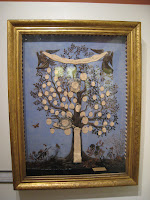 A few weeks after we signed the lease for the house, C came down the terraces from Jules' summer house with a funny look on his face. We sat down in two of the five chairs that we had borrowed--our furniture was still at sea--and C told me that Jules wanted us to pay our rent in cash. The day we had signed the contract, we had agreed to send the rent to his two daughters who live abroad, an arrangement that C thought demonstrated Jules' devotion to his children. I thought it probably demonstrated something else.
A few weeks after we signed the lease for the house, C came down the terraces from Jules' summer house with a funny look on his face. We sat down in two of the five chairs that we had borrowed--our furniture was still at sea--and C told me that Jules wanted us to pay our rent in cash. The day we had signed the contract, we had agreed to send the rent to his two daughters who live abroad, an arrangement that C thought demonstrated Jules' devotion to his children. I thought it probably demonstrated something else.And when word came down the terraces that he wanted the rent in cash, I was proved right. It's a time-honored tradition in France: defrauding the government. It goes back to the days in which tax collectors for the crown went door to door and window to window, making lists of all the tangible property they could see (wardrobes, tables, tankards, sacks of flour, barrels of wine) and then presenting the owners with a tax bill. It's why French houses have shutters: you could only be taxed on what the collector could see, and if your shutters remained closed...
Jules explained to us that we were not to worry about this arrangement. It was completely normale and, besides, it was nobody's business, it was a private matter between us. If, he said, dropping his voice, we were to meet the mayor of the village, we should not say that we were renting the house. We should say that we were friends of Jules, and that he was lending us the house.
We nodded, laid low by the torrent of French. Later we laughed at the notion that we would ever meet the mayor and, should we meet him, have occasion to discuss our living arrangements.
That Saturday evening we took ourselves off to a chamber music concert on the opposite hill, part of a series of summer concerts put on by the village in an old chapel. After the concert there was the traditional pot d'amitié. Everyone had a plastic tumbler (or two or three) of rosé and stood around in the courtyard chatting. We had no one to chat to, since we'd only been in the village for a matter of days, so we sipped at our wine and then slipped out of the courtyard.
A man followed us. He was of a certain age, tallish, with thick greying hair, dressed for the part of a country gentleman. When we stopped at the Roman ruins just in front of the chapel, he caught up with us.
Vous habitez dans le village? Do you live in the village? he asked.
Oui, yes, for only a few days we live in the village, since Wednesday, we said, not worrying much about tenses or parts of speech.
Et vous êtes anglais?
No, no, American, we explained. We went through our story a bit--it has been a pattern of our lives that when perfect strangers approach us we come straight out with our life stories, up to and including address, phone number, and, if asked, social security numbers. It is a character trait that makes some of our relations anxious.
Ah, he said. Then, to show reciprocity--his story for ours--he said, Moi, je suis le maire du village. I am the mayor of the village. Welcome; I hope that you are happy here.
We were startled, immediately on our guard. What if he next asked us where we lived?
And he did: Où habitez-vous dans le village? Vous êtes locataires? Are you renting a house?
I flipped through all the French verbs in my brain and luckily came up with prêter, to lend. We live, I said, at La Bastiole. I described where the house was.
The mayor nodded. Vous êtes chez Jules? Are you staying in Jules' house? It's a small village.
Yes, we said. We are friends of Jules. Il nous prête la maison. He is lending us the house. We looked (nervously, I'm sure) at each other, relieved to have told the tale successfully.
The mayor nodded, to indicate that he had understood our French, that what we had said made sense. And then, to indicate that not only had he understood the surface but that he plumbed the depths, he did something else. He winked, an exaggerated stage wink.
Then he smiled, clicked his heels together, gave a small bow, and wished us a good evening and a good life in the village. He went back to the pot, and we went to our car and drove home through the cool night air, shaking our heads and wondering what we had gotten ourselves into.













































